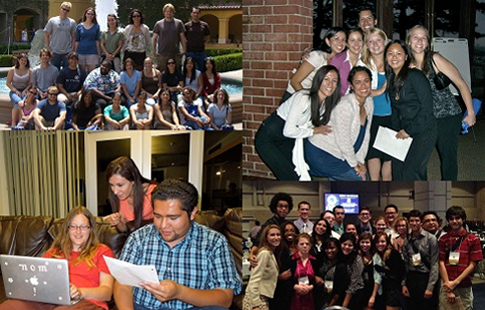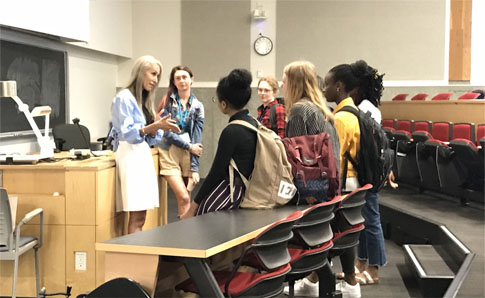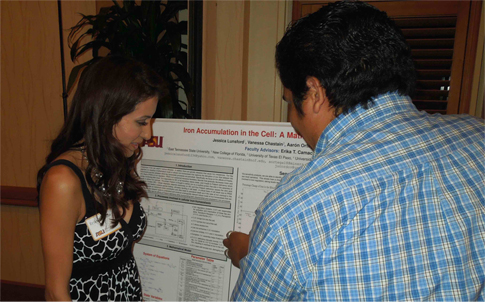For me, mentoring is very personal both because I was a benefactor of it during my high school and early college years and because I didn’t always have good mentoring along the way. During my career path, there have been so many times that I was ready to walk away and I would have done it if it wasn’t for the very few mentors and friends that encouraged me to stay.
Successful mentoring usually requires carefully thought-out challenges and consistent monitoring and support that allows the mentee to succeed and realize her/his potential while pursuing her/his goals. I try to guide my mentees through opportunities that will help them meet these challenges.
Mentoring is multi-faceted and I truly believe that there are abundant opportunities to engage in it and impact many. Broadly speaking, I view mentoring as creating opportunities and I try to seek out situations that will benefit those who might otherwise lack such an opportunity.
Mentoring Through Research
My mentoring through research of students often involves my own line of research but sometimes can be completely independent.
Selected publications with students
(* denotes undergraduate at time of work; ** denotes graduate student at time of work)
- W.K. Caldwell*, B. Freedman*, L. Settles*, M.M. Thomas*, E.T. Camacho, S. Wirkus, 2019, "The Vicodin abuse problem: A mathematical approach," Journal of Theoretical Biology, 483.
- E.T. Camacho, D. Brager**, G. Elachouri, T. Korneyeva*, G. Millet-Puel**, J.-A. Sahel, T. Léveillard, 2019, A Mathematical Analysis of Aerobic Glycolysis Triggered by Glucose Uptake in Cones", Scientific Reports, 9(1).
- K.D. Dahlquist, B.G. Fitzpatrick, E.T. Camacho, S.D. Entzminger*, and N.C. Wanner*, 2015,"Parameter Estimation for Gene Regulatory Networks from Microarray Data: Cold Shock Response in Saccharomyces cerevisiae," Bulletin of Mathematical Biology, 77(8).
- B. Morin**, L. Medina-Rios*, E.T. Camacho, C. Castillo-Chavez, 2010, "Static Behavioral Effects on Gonorrhea Transmission Dynamics in a MSM Population," Journal of Theoretical Biology, 267(1).
Summer Research Programs
I was inspired to go to grad school after having done research in an undergraduate summer research program. To help create a similar opportunity for others, I co-founded and co-directed the Applied Mathematical Sciences Summer Institute that ran from 2005–2007 and was jointly held with Loyola Marymount University and Cal Poly Pomona. Each summer, students came to Los Angeles to conduct research during this intensive 7-week program. From 2011–2013, I co-directed the Mathematical and Theoretical Biology Institute (MTBI) at Arizona State University.
Selected Summer Undergraduate Research Projects
- V. Chastain*, J. Lunsford*, A. Ortega*, R. Reyes-Grimaldo*, E.T. Camacho, 2012, "Iron Accumulation in the Cell: A Mathematical Model of Friedreich's Ataxia," MTBI-09-02M, MTBI/SUMS Technical Reports.
- J. Baez*, T. Gonzalez*, A. Murillo**, D. Toupo*, R. Zarate*, E.T. Camacho, 2011, "My βIG Fat Math Model: β-Cell Compensation and Type 2 Diabetes," MTBI-08-04M, MTBI/SUMS Technical Reports.
- L. Almada*, R. Rodriguez*, M. Thompson*, L. Voss*, L. Smith**, E.T. Camacho, 2006, "Deterministic and Small-World Network Models of College Drinking Patterns," California Polytechnic University Department of Mathematics & Statistics Technical Report, AMSSI.
- J. Hunt *, L. LaPlace*, E. Miller*, J. Pham*, E.T. Camacho, S. Wirkus, 2005, "A Continuous Model of Gene Expression," California Polytechnic University Department of Mathematics & Statistics Technical Report, pp. 43-63, AMSSI.
- J. Abiva*, E. Joseph*, A. Mikaelian*, C. Rogers*, J. Shelton**, E.T. Camacho, S. Wirkus, 2005, "Alcohol's Effect on Neuron Firing," California Polytechnic University Department of Mathematics & Statistics Technical Report, pp. 139-163, AMSSI.


Jaime Escalante
I was taught by Jaime Escalante at Garfield High School in East Los Angeles, CA. I was there many years after the class that was the subject of the movie Stand and Deliver that chronicled his methods of teaching and interactions with students. I try to teach Escalante's motto to my students: with ganas anything is possible.
- Interview on Jaime Escalante, New York Times, Obituary of Jaime Escalante, April 1, 2010.
- Interview on Jaime Escalante, Hispanic Link Weekly Report, "Edward Olmos 'Stands and Delivers' for Teacher He Portrayed," 28(8), March 15,2010 .
- Interview on Jaime Escalante, Hispanic Link Weekly Report, "East Los Angeles Calculus Teacher Jaime Escalante Dies at Age 79," 28(11), April 5, 2010 .












